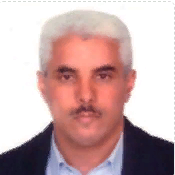
Kechar Bouabdellah.
Work place: Department of Science Computer, Faculty of Science, University Hassiba Ben Bouali, Hey salem, Chlef, Algeria
E-mail: bkechar@yahoo.fr
Website:
Research Interests: Computer Networks, Network Architecture
Biography
Mr. KECHAR Bouabdellah (kechar.bouabdellah@univ-oran.dz) is an assistant professor in the Department of Computer Science at Oran University, Algeria where he received his Ph.D. in 2010. He has authored several journal publications, refereed conference publications and one book chapter. He has been a member of the technical program and organizing committees of several international IEEE/ACM conferences and workshops. He also serves as a referee of a few renowned journals such as IEEE Transactions on computers, IEEE Systems Journal.
His current research interests include mobile wireless sensor/actuator networks, Zigbee/IEEE 802.15.4 technologies deployment, hybrid cellular networks, Vehicular ad hoc networks, vehicular sensor networks and heterogeneous wireless networks, with special emphasis on radio resource management techniques, performance modelling, provisioning QoS and practical societal and industrial applications. He is currently head of a research team on wireless sensor networks and their societal and industrial applications.
Author Articles
Impact of Model Mobility in Ad Hoc Routing Protocols
By TAHAR ABBES Mounir Senouci Mohamed Kechar Bouabdellah.
DOI: https://doi.org/10.5815/ijcnis.2012.10.05, Pub. Date: 8 Sep. 2012
An Ad Hoc network is a temporary network without infrastructure, dynamically formed by mobile devices without turning to any existing centralized administration. To send packets to remote nodes, a node use other nodes as intermediate relays, and ask them to transmit its packets. For this purpose, a routing protocol is needed. Because mobile devices are used, the network topology is unpredictable and can change at any time. The objective of this paper is to know the effect of mobility on the performance of Ad Hoc routing protocols, based on multi simulations performed with Glomosim.
[...] Read more.Other Articles
Subscribe to receive issue release notifications and newsletters from MECS Press journals